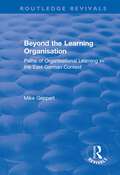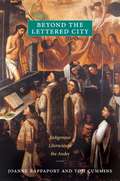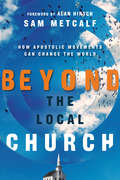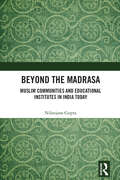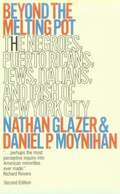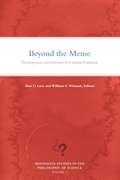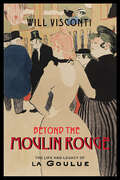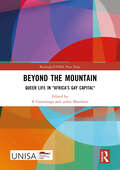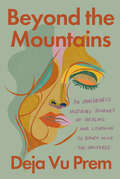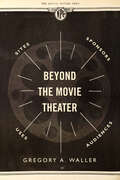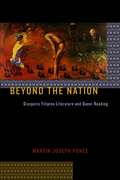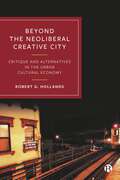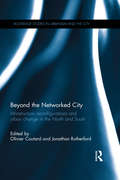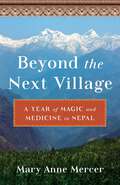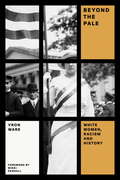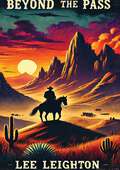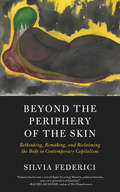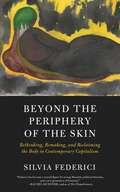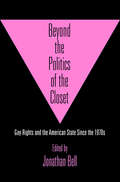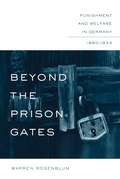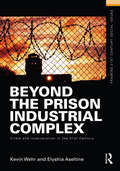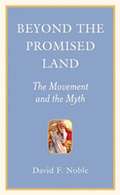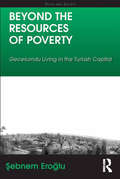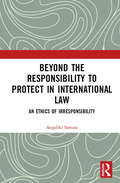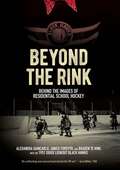- Table View
- List View
Beyond the Learning Organisation: Paths of Organisational Learning in the East German Context (Routledge Revivals)
by Mike GeppertThis title was first published in 2000. In contemporary management literature, the idea that managers and organizations should learn and provide widespread capabilities for learning to learn is gaining popularity. Some see reflexive thinking and learning as being the proper response to the transformation of industrial society. However, this study is not concerned too much with the reasons for learning, but is more about how actors and groups of actors actually learn and the resources at their disposal for learning. The study aims to show that differences in social context do matter, and analyzes the organizational learning process in the political and social transformation of East Germany.
Beyond the Lettered City: Indigenous Literacies in the Andes
by Tom Cummins Joanne RappaportIn Beyond the Lettered City, the anthropologist Joanne Rappaport and the art historian Tom Cummins examine the colonial imposition of alphabetic and visual literacy on indigenous groups in the northern Andes. They consider how the Andean peoples received, maintained, and subverted the conventions of Spanish literacy, often combining them with their own traditions. Indigenous Andean communities neither used narrative pictorial representation nor had alphabetic or hieroglyphic literacy before the arrival of the Spaniards. To absorb the conventions of Spanish literacy, they had to engage with European symbolic systems. Doing so altered their worldviews and everyday lives, making alphabetic and visual literacy prime tools of colonial domination. Rappaport and Cummins advocate a broad understanding of literacy, including not only reading and writing, but also interpretations of the spoken word, paintings, wax seals, gestures, and urban design. By analyzing secular and religious notarial manuals and dictionaries, urban architecture, religious images, catechisms and sermons, and the vast corpus of administrative documents produced by the colonial authorities and indigenous scribes, they expand Ángel Rama's concept of the lettered city to encompass many of those who previously would have been considered the least literate.
Beyond the Local Church: How Apostolic Movements Can Change the World
by Sam Metcalf2016 IVP Readers' Choice Award
Beyond the Madrasa: Muslim Communities and Educational Institutes in India Today
by Nilanjana GuptaThis book looks at madrasas and educational institutions run by Muslim communities in India focusing on the history, social relevance and importance of these institutions. It provides a sensitive and in-depth analysis of the push and pull of tradition, religiosity and modernity within these establishments. The book studies several institutions in Kozhikode, Surat, Mumbai, Hyderabad, Barak Valley in Assam, Ladakh, Delhi and several cities in Uttar Pradesh and examines new initiatives, curricula, models of education and professional training being offered. It contextualises educational reforms in madrasas in response to changing policies and larger socio-economic realities in contemporary India. It also interrogates stereotypes associated with Islam and madrasa education, paying particular attention to their syllabi and desired outcomes. This book also looks at the roles and positions of women in these institutions. Emphasising the long and complex history of Muslim communities and madrasas, the book showcases the remarkable diversity of approaches and pedagogical practices which combine deeni and duniyadi education across India today. This book will be of interest to students and researchers of the history of education, religious education, comparative education and sociology. It will also be useful to people working with NGOs and policymakers in the field of educational reform and planning.
Beyond the Melting Pot: The Negroes, Puerto Ricans, Jews, Italians, and Irish of New York City
by Nathan Glazer Daniel P. MoynihanThis is a classic study of various ethnic groups in New York City, their history, and social conditions through the 1960s.
Beyond the Meme: Development and Structure in Cultural Evolution (Minnesota Studies in the Philosophy of Science #22)
by Alan C. Love William C. WimsattInterdisciplinary perspectives on cultural evolution that reject meme theory in favor of a complex understanding of dynamic change over time How do cultures change? In recent decades, the concept of the meme, posited as a basic unit of culture analogous to the gene, has been central to debates about cultural transformation. Despite the appeal of meme theory, its simplification of complex interactions and other inadequacies as an explanatory framework raise more questions about cultural evolution than it answers. In Beyond the Meme, William C. Wimsatt and Alan C. Love assemble interdisciplinary perspectives on cultural evolution, providing a nuanced understanding of it as a process in which dynamic structures interact on different scales of size and time. By focusing on the full range of evolutionary processes across distinct contexts, from rice farming to scientific reasoning, this volume demonstrates how a thick understanding of change in culture emerges from multiple disciplinary vantage points, each of which is required to understand cultural evolution in all its complexity. The editors provide an extensive introductory essay to contextualize the volume, and Wimsatt contributes a separate chapter that systematically organizes the conceptual geography of cultural processes and phenomena.Any adequate account of the transmission, elaboration, and evolution of culture must, this volume argues, recognize the central roles that cognitive and social development play in cultural change and the complex interplay of technological, organizational, and institutional structures needed to enable and coordinate these processes.Contributors: Marshall Abrams, U of Alabama at Birmingham; Claes Andersson, Chalmers U of Technology; Mark A. Bedau, Reed College; James A. Evans, U of Chicago; Jacob G. Foster, U of California, Los Angeles; Michel Janssen, U of Minnesota; Sabina Leonelli, U of Exeter; Massimo Maiocchi, U of Chicago; Joseph D. Martin, U of Cambridge; Salikoko S. Mufwene, U of Chicago; Nancy J. Nersessian, Georgia Institute of Technology and Harvard U; Paul E. Smaldino, U of California, Merced; Anton Törnberg, U of Gothenburg; Petter Törnberg, U of Amsterdam; Gilbert B. Tostevin, U of Minnesota.
Beyond the Moulin Rouge: The Life and Legacy of La Goulue (Peculiar Bodies)
by Will ViscontiBest known by her stage name, La Goulue (the Glutton), Louise Weber was one of the biggest stars of fin de siècle Paris, renowned as a cancan dancer at the Moulin Rouge. The subject of numerous paintings and photographs, she became an iconic figure of modern art. Her life, however, has consistently been misrepresented and reduced to a footnote in the stories of men such as Henri de Toulouse-Lautrec. Where most accounts dismiss her rise and fall as brief and rapid, the truth is that her career as a performer spanned five decades, during which La Goulue constantly reinvented herself—as a dancer, animal tamer, sideshow performer, and muse of photographers, painters, sculptors, and filmmakers.With Beyond the Moulin Rouge, the first substantive English-language study of La Goulue’s career and posthumous influence, Will Visconti corrects persistent myths. Despite a tumultuous personal life, La Goulue overcame loss, abusive relationships, and poverty to become the very embodiment of nineteenth-century Paris, fêted by royalty and followed as closely as any politician or monarch.Visconti draws on previously overlooked materials, including medical records, media reports across Europe and the United States, and surviving pages from Louise Weber’s diary, to trace the life and impact of a woman whose cultural significance has been ignored in favor of the men around her, and who spent her life upending assumptions about gender, morality, and domesticity in France during the fin de siècle and early twentieth century.Peculiar Bodies: Stories and Histories
Beyond the Mountain: Queer Life in "Africa’s Gay Capital" (Routledge/UNISA Press Series)
by B Camminga Zethu MatebeniBeyond The Mountain: Queer Life in "Africa’s Gay Capital" contributes to the body of knowledge on the lived experiences of lesbian, gay, bisexual, transgender, queer, and intersex (LGBTQI) communities in Cape Town. The book provides insight on the lives of the LGBTQI communities in Cape Town and challenges the stereotypes and prejudices against these communities. The chapters consist of both narratives of lived experiences and academic discussions presented by novice as well as experienced scholars. The imagery of beyond the mountain is a depiction of the lives of LGBTQI community and immovable negative perceptions the general public have to them and seeks to expose their world and the kinds of violence and abuse they are subjected to, as well as unveiling the racial discrimination within these communities. The book revolves around five themes: education, emancipation, protection, acceptance, and integration of those who identify as LGBTQI people in society.
Beyond the Mountains: An Immigrant's Inspiring Journey of Healing and Learning to Dance with the Universe
by Deja Vu PremThe powerful story of how an immigrant from the Philippines overcame childhood trauma and an emotionally abusive marriage to find her voice and thriveAs a child in a small barrio in the Philippines, Deja Vu Prem faced neglect and physical abuse. At age seventeen, desperate to escape her situation and claim a better life for herself beyond the mountains of her town, she became a mail-order bride and moved to San Francisco. But the challenges of her childhood didn&’t go away—they merely evolved into the form of her emotionally abusive husband.Cut off from her family and any kind of emotional or financial support, Prem was a prisoner in her own home, unable even to use the phone or check the mail. But she wasn&’t helpless. Relying on her deep faith and the fire within that had always pushed her to achieve, Prem made the brave decision to escape her situation to provide a better life for herself and her two young children.Recounting Prem&’s harrowing yet hopeful journey, Beyond the Mountains is a stirring and moving portrait of one immigrant&’s refusal to be defined as a victim and a testament on finding the strength to forgive in order to reclaim the power that lives within us all.
Beyond the Movie Theater: Sites, Sponsors, Uses, Audiences
by Gregory A. WallerA free ebook version of this title is available through Luminos, University of California Press's Open Access publishing program. Visit www.luminosoa.org to learn more.Beyond the Movie Theater excavates the history of non-theatrical cinema before 1920, exploring where and how moving pictures of the 1910s were used in ways distinct from and often alternative to typical theatrical cinema. Unlike commercial cinema, non-theatrical cinema was multi-purpose in its uses and multi-sited in where it could be shown, targeted at particular audiences and, in some manner, sponsored. Relying on contemporary print sources and ephemera of the era to articulate how non-theatrical cinema was practiced and understood in the US during the 1910s, historian Gregory A. Waller charts a heterogeneous, fragmentary, and rich field that cannot be explained in terms of a master narrative concerning origin or institutionalization, progress or decline. Uncovering how and where films were put to use beyond the movie theater, this book complicates and expands our understanding of the history of American cinema, underscoring the myriad roles and everyday presence of moving pictures during the early twentieth century.
Beyond the Nation: Diasporic Filipino Literature and Queer Reading (Sexual Cultures #46)
by Martin Joseph PoncePart of the American Literatures Initiative Series Beyond the Nation charts an expansive history of Filipino literature in the U.S., forged within the dual contexts of imperialism and migration, from the early twentieth century into the twenty-first. Martin Joseph Ponce theorizes and enacts a queer diasporic reading practice that attends to the complex crossings of race and nation with gender and sexuality. Tracing the conditions of possibility of Anglophone Filipino literature to U.S. colonialism in the Philippines in the early twentieth century, the book examines how a host of writers from across the century both imagine and address the Philippines and the United States, inventing a variety of artistic lineages and social formations in the process. Beyond the Nation considers a broad array of issues, from early Philippine nationalism, queer modernism, and transnational radicalism, to music-influenced and cross-cultural poetics, gay male engagements with martial law and popular culture, second-generational dynamics, and the relation between reading and revolution. Ponce elucidates not only the internal differences that mark this literary tradition but also the wealth of expressive practices that exceed the terms of colonial complicity, defiant nationalism, or conciliatory assimilation. Moving beyond the nation as both the primary analytical framework and locus of belonging, Ponce proposes that diasporic Filipino literature has much to teach us about alternative ways of imagining erotic relationships and political communities.
Beyond the Neoliberal Creative City: Critique and Alternatives in the Urban Cultural Economy
by Robert G. HollandsA buoyant, creative economy can be seen as the saviour of many cities, but behind such ‘urban makeovers’ lie serious problems such as widening inequalities, job precarity, gentrification and environmental issues. In light of the pandemic and climate crisis, how well are city economies, based largely on culture, nightlife and tourism, meeting basic societal needs? Blending lively case studies of alternative cultural practices and spaces with broader theoretical debates, this book explores the opportunities for a more just and sustainable urban future.
Beyond the Networked City: Infrastructure reconfigurations and urban change in the North and South (Routledge Studies in Urbanism and the City)
by Olivier Coutard Jonathan RutherfordCities around the world are undergoing profound changes. In this global era, we live in a world of rising knowledge economies, digital technologies, and awareness of environmental issues. The so-called "modern infrastructural ideal" of spatially and socially ubiquitous centrally-governed infrastructures providing exclusive, homogeneous services over extensive areas, has been the standard of reference for the provision of basic essential services, such as water and energy supply. This book argues that, after decades of undisputed domination, this ideal is being increasingly questioned and that the network ideology that supports it may be waning. In order to begin exploring the highly diverse, fluid and unstable landscapes emerging beyond the networked city, this book identifies dynamics through which a ‘break’ with previous configurations has been operated, and new brittle zones of socio-technical controversy through which urban infrastructure (and its wider meaning) are being negotiated and fought over. It uncovers, across a diverse set of urban contexts, new ways in which processes of urbanization and infrastructure production are being combined with crucial sociopolitical implications: through shifting political economies of infrastructure which rework resource distribution and value creation; through new infrastructural spaces and territorialities which rebundle socio-technical systems for particular interests and claims; and through changing offsets between individual and collective appropriation, experience and mobilization of infrastructure. With contributions from leading authorities in the field and drawing on theoretical advances and original empirical material, this book is a major contribution to an ongoing infrastructural turn in urban studies, and will be of interest to all those concerned by the diverse forms and contested outcomes of contemporary urban change across North and South.
Beyond the Next Village: A Year of Magic and Medicine in Nepal
by Mary Anne MercerBeyond the Next Village is Mary Anne Mercer&’s memoir of discovery, growth, and awakening in 1978 Nepal, which was then a mysterious country to most of the world. After arriving in Nepal, Mercer, an American nurse, spent a year traveling on foot—often in flip-flops—with a Nepali health team, providing immunizations and clinical care in each village they visited. Communicating in a newly acquired language, she was often called upon to provide the only modern medicine available to the people she and her team were serving. Over time, she learned to recognize and respect the prominence of their cultural beliefs about health and illness. Encounters with life-threatening conditions such as severe malnutrition and ectopic pregnancy gave her an enlightening view of both the limitations and power of modern health care; immersed in villagers&’ lives and those of her own team, she realized she was living in not just another country, but another time. This unique story of the joys and perils of one woman&’s journey in the shadow of the Himalayas, Beyond the Next Village opens a window into a world where the spirits were as real as the trees, the birds, or the rain—and healing could be as much magic as medicine.
Beyond the Pale
by Vron Ware Mikki KendallHow have ideas about white women figured in the history of racism? Vron Ware argues that they have been central, and that feminism has, in many ways, developed as a political movement within racist societies. Dissecting the different meanings of femininity and womanhood, Beyond the Pale examines the political connections between black and white women, both within contemporary racism and feminism, as well as in historical examples like the anti-slavery movement and the British campaign against lynching in the United States. Beyond the Pale is a major contribution to anti-racist work, confronting the historical meanings of whiteness as a way of overcoming the moralism that so often infuses anti-racist movements.From the Trade Paperback edition.
Beyond the Pass
by Lee LeightonLee Leighton’s Beyond the Pass is a gripping Western adventure that captures the untamed spirit of the American frontier, blending action, drama, and a deep exploration of human resilience. Set in a rugged and unforgiving landscape, this novel tells the story of determination, survival, and the quest for a better future against all odds.The story follows a group of settlers venturing beyond the pass into uncharted territory, seeking to carve out a new life in a land full of promise but fraught with danger. Led by a strong and resourceful protagonist, they face harsh terrain, unpredictable weather, and the constant threat of outlaws and hostile forces. As the journey unfolds, the characters must confront not only external challenges but also their inner fears and conflicts, forging bonds of loyalty and trust along the way.Leighton’s vivid descriptions bring the frontier to life, immersing readers in the vast landscapes and the perils that come with taming the wilderness. The novel’s themes of perseverance, courage, and the enduring power of hope resonate deeply, creating a story that is both thrilling and emotionally compelling.Beyond the Pass is a classic Western tale that will appeal to fans of frontier fiction, rugged adventure, and stories of human endurance. With its richly drawn characters and masterful storytelling, Lee Leighton’s novel is a tribute to the spirit of the pioneers who dared to push beyond the known and into the wild unknown.
Beyond the Periphery of the Skin: Rethinking, Remaking, and Reclaiming the Body in Contemporary Capitalism (KAIROS)
by Silvia FedericiMore than ever, "the body" is today at the center of radical and institutional politics. Feminist, antiracist, trans, ecological movements: all look at the body, in its manifold manifestations, as a ground of confrontation with the state and a vehicle for transformative social practices. Concurrently, the body has become a signifier for the reproduction crisis the neoliberal turn in capitalist development has generated and for the international surge in institutional repression and public violence. In Beyond the Periphery of the Skin, lifelong activist and best-selling author Silvia Federici examines these complex processes, placing them in the context of the history of the capitalist transformation of the body into a work-machine, expanding on one of the main subjects of her first book, Caliban and the Witch. Federici surveys the new paradigms that today govern how the body is conceived in the collective radical imagination, as well as the new disciplinary regimes state and capital are deploying in response to mounting revolt against the daily attacks on our everyday reproduction. In this process she confronts some of the most important questions for contemporary radical political projects. What does "the body" mean, today, as a category of social/political action? What are the processes, institutional or anti-systemic, by which it is constituted? How do we dismantle the tools by which our bodies have been "enclosed" and collectively reclaim our capacity to govern them?
Beyond the Periphery of the Skin: Rethinking, Remaking, and Reclaiming the Body in Contemporary Capitalism
by Silvia FedericiMore than ever, “the body” is today at the center of radical and institutional politics. Feminist, antiracist, trans, ecological movements–all look at the body in its manifold manifestations as a ground of confrontation with the state and a vehicle for transformative social practices. Concurrently, the body has become a signifier for the reproduction crisis the neoliberal turn in capitalist development has generated and for the international surge in institutional repression and public violence. In Beyond the Periphery of the Skin, lifelong activist and best-selling author Silvia Federici examines these complex processes, placing them in the context of the history of the capitalist transformation of the body into a work-machine. Building on three groundbreaking lectures, Federici surveys the new paradigms that today govern how the body is conceived in the collective radical imagination, as well as the new disciplinary regimes state and capital are deploying in response to mounting revolt against the daily attacks on our everyday reproduction. In this process she confronts some of the most important questions for contemporary radical political projects. What does “the body” mean, today, as a category of social/political action? What are the processes by which it is constituted? How do we dismantle the tools by which our bodies have been “enclosed” and collectively reclaim our capacity to govern them?
Beyond the Politics of the Closet: Gay Rights and the American State Since the 1970s
by Jonathan BellA collection of essays that demonstrate how LGBT people played critical roles in local, state, and national politicsIn the 1970s, queer Americans demanded access not only to health and social services but also to mainstream Democratic and Republican Party politics. The AIDS crisis of the 1980s made the battles for access to welfare, health care, and social services for HIV-positive Americans, many of them gay men, a critically important story in the changing relationship between sexual minorities and the government. The 1980s and 1990s marked a period in which religious right attacks on the civil rights of minorities, including LGBT people, offered opportunities for activists to create campaigns that could mobilize a base in mainstream politics and contribute to the gradual legitimization of sexual minorities in American society.Beyond the Politics of the Closet features essays by historians whose work on LGBT history delves into the decades between the mid-1970s and the millennium, a period in which the relationship between activist networks, the state, capitalism, and political parties became infinitely more complicated. Examining the crucial relationship between sexuality, race, and class, the volume highlights the impact gay rights politics and activism have had on the wider American political landscape since the rights revolutions of the 1960s.The three sections of Beyond the Politics of the Closet conceptualize LGBT politics both chronologically and thematically. The first section highlights the ways in which the immediate post-rights revolution period created new demands on the part of sexual minorities for social services, especially in health care and housing. The second examines the impact of the AIDS crisis on different aspects of national and local LGBT politics. The last section considers how analyzing LGBT politics can reorient our understanding of "the closet" and illuminate the challenges for those seeking to integrate questions of sexual rights into broader political narratives, whether of the left or the right.Contributors: Ian M. Baldwin, Katie Batza, Jonathan Bell, Julio Capó, Jr., Rachel Guberman, Clayton Howard, Kevin Mumford, Dan Royles, Timothy Stewart-Winter
Beyond the Prison Gates
by Warren RosenblumGermany today has one of the lowest incarceration rates in the industrialized world, and social welfare principles play an essential role at all levels of the German criminal justice system. Warren Rosenblum examines the roots of this social approach to criminal policy in the reform movements of the Wilhelmine and Weimar periods, when reformers strove to replace state institutions of control and incarceration with private institutions of protective supervision.Reformers believed that private charities and volunteers could diagnose and treat social pathologies in a way that coercive state institutions could not. The expansion of welfare for criminals set the stage for a more economical system of punishment, Rosenblum argues, but it also opened the door to new, more expansive controls over individuals marked as "asocial." With the reformers' success, the issue of who had power over welfare became increasingly controversial and dangerous. Other historians have suggested that the triumph of eugenics in the 1890s was predicated upon the abandonment of liberal and Christian assumptions about human malleability. Rosenblum demonstrates, however, that the turn to "criminal biology" was not a reaction against social reform, but rather an effort to rescue its legitimacy.
Beyond the Prison Industrial Complex: Crime and Incarceration in the 21st Century (Framing 21st Century Social Issues)
by Kevin Wehr Elyshia AseltineThis short text, ideal for Social Problems and Criminal Justice courses, examines the American prison system, its conditions, and its impact on society. Wehr and Aseltine define the prison industrial complex and explain how the current prison system is a contemporary social problem. They conclude by using California as a case study, and propose alternatives and alterations to the prison system.
Beyond the Promised Land: The Movement and the Myth (Provocations #1)
by David F. NobleIconoclast David F. Noble traces the evolution and eclipse of the biblical mythology of the Promised Land, the foundational story of Western Culture. Part impassioned manifesto, part masterful survey of opposed philosophical and economic schools, Beyond the Promised Land brings into focus the twisted template of the Western imagination and its faith-based market economy. From the first recorded versions of “the promise” saga in ancient Babylon, to the Zapatistas’ rejection of promises never kept, Noble explores the connections between Judeo-Christian belief and corporate globalization. Inspiration for activists and students alike.
Beyond the Resources of Poverty: Gecekondu Living in the Turkish Capital (Cities and Society)
by Sebnem ErogluThis groundbreaking volume researches the lives of gecekondu settlers in the capital city of Turkey in order to understand how households cope with poverty and why some households are more successful than others in reducing their deprivation. It takes a critical stance towards existing conceptions such as household survival, livelihood and coping strategy and develops an alternative model based on four types of household response to poverty: income generation, income allocation, consumption and investment. In explaining household responses and their outcomes for poverty, the book demonstrates the role of different resources beyond income including social, economic and cultural capital. It emphasises broader structural factors such as labour market processes and state policies which influence the availability and/or benefit delivery capacity of household resources, and thereby moves beyond the dominant view which overemphasises the resilience of the poor. Gender divisions within the household are also examined. The book adopts an innovative method for measuring poverty. The new method combines 'objective' and subjective dimensions of deprivation to develop a unique way of addressing two central questions: what are those standards of living whose absence indicates deprivation, and how can the value of each standard of living be determined?
Beyond the Responsibility to Protect in International Law: An Ethics of Irresponsibility
by Angeliki SamaraThis book offers a critical appraisal of the international legal idea of the ‘Responsibility to Protect’. The idea that the international community has a responsibility to protect populations at risk has become the prominent mode and structure of address in response to mass human atrocities, gross human rights violations, and large-scale loss of life. Although the "international community" of liberal international law and of legal cosmopolitanism for the most part projects a self-assured collective project, this book maintains that it transforms global ethical responsibility into a project of governance, management, and control. Pursuing this argument, and drawing on critical legal literature, critical international relations and on ideas of responsibility and ethical relationality in the work of Jacques Derrida and Judith Butler, the book develops a concept of "irresponsibility". This concept is then juxtaposed to the dominant Responsibility to Protect discourse. By exposing and acknowledging "the sites of irresponsibility" of the Responsibility to Protect, the book argues that irresponsibility itself can become the condition of ethical responsibility and the possibility of justice. This original approach to an increasingly important topic will prove invaluable to those working in international law, international relations, politics and legal theory.
Beyond the Rink: Behind the Images of Residential School Hockey
by Alexandra Giancarlo Janice Forsyth Braden Te HiwiTeammates, champions, Survivors In 1951, after winning the Thunder Bay district championship, the Sioux Lookout Black Hawks hockey team from Pelican Lake Indian Residential School embarked on a whirlwind promotional tour through Ottawa and Toronto. They were accompanied by a professional photographer from the National Film Board who documented the experience. The tour was intended to demonstrate the success of the residential school system and introduce the Black Hawks to “civilizing” activities and the “benefits” of assimilating into Canadian society. For some of the boys, it was the beginning of a lifelong love of hockey; for others, it was an escape from the brutal living conditions and abuse at the residential school. In Beyond the Rink, Alexandra Giancarlo, Janice Forsyth, and Braden Te Hiwi collaborate with three surviving team members—Kelly Bull, Chris Cromarty, and David Wesley—to share the complex legacy behind the 1951 tour photos. This book reveals the complicated role of sports in residential school histories, commemorating the team’s stellar hockey record and athletic prowess while exposing important truths about “Canada’s Game” and how it shaped ideas about the nation. By considering their past, these Survivors imagine a better way forward not just for themselves, their families, and their communities, but for Canada as a whole.
